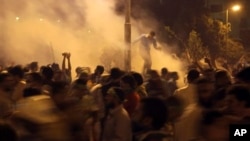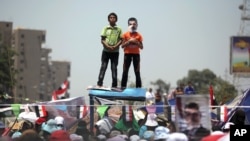Violent clashes have broken out in Cairo and Alexandria, where tens of thousands of Egyptians took to the streets Friday in dueling rallies — one called by the military to show support for overturning the elected civilian government, the other called by the Muslim Brotherhood to reinforce its demand for the reinstatement of ousted president Mohamed Morsi.
In Alexandria, supporters and opponents of ousted President Mohamed Morsi pelted each other with rocks. Video showed Muslim Brotherhood supporters firing bird shot at pro-government demonstrators who support the military and its interim government. Medical sources and state-run media said five people were killed and many others were injured.
In Cairo, Morsi supporters clashed in Tahrir Square with some of the thousands of people who answered Army chief Abdel Fattah el-Sissi's call for "all honorable Egyptians" to take to the streets to give him a mandate to fight "violence and terrorism."
As Karim Hassan, one man in the pro-government throng, said, "We are here today in order to support the commander-in-chief of the Egyptian Armed Forces ... and give him a green card [a go-ahead] to root out terrorism from Egypt. We can't wait any longer; the country is burning."
In Alexandria, supporters and opponents of ousted President Mohamed Morsi pelted each other with rocks. Video showed Muslim Brotherhood supporters firing bird shot at pro-government demonstrators who support the military and its interim government. Medical sources and state-run media said five people were killed and many others were injured.
In Cairo, Morsi supporters clashed in Tahrir Square with some of the thousands of people who answered Army chief Abdel Fattah el-Sissi's call for "all honorable Egyptians" to take to the streets to give him a mandate to fight "violence and terrorism."
As Karim Hassan, one man in the pro-government throng, said, "We are here today in order to support the commander-in-chief of the Egyptian Armed Forces ... and give him a green card [a go-ahead] to root out terrorism from Egypt. We can't wait any longer; the country is burning."
Morsi still detained
The demonstrations got under way as an Egyptian judge ordered Morsi to remain in custody for at least 15 more days. He has been held by the military in a secret location since July 3, when the army removed him from power.
Key Dates in Egypt
Key Dates in Egypt- February 11, 2011 - President Hosni Mubarak resigns after weeks of massive protests and clashes
- January 21, 2012 - The Muslim Brotherhood's Freedom and Justice Party wins almost half of Egypt's parliamentary seats
- June 24, 2012 - Mohamed Morsi becomes Egypt's first freely elected president
- November 22, 2012 - Morsi grants himself sweeping powers, sparking protests
- July 3, 2013 - The army removes Morsi from power and suspends the constitution
The official MENA news agency said authorities are investigating charges that Morsi conspired with the Hamas group to help himself and dozens of other Islamist leaders escape from prison during the 2011 uprising that toppled former President Hosni Mubarak. The Muslim Brotherhood has said local residents helped free the prisoners, and a spokesman said Friday that the latest word from the government was proof that Egypt is returning to the tight controls on the public that marked the Mubarak era.
Hamas spokesman Sami Abu Zuhri also rejected the accusations and challenged Egyptian authorities to provide evidence that Hamas intervened in Egypt's internal affairs.
As they have on a daily basis, Morsi supporters massed Friday outside the Rabia el-Adawiya Mosque in Cairo's Nasr City, a Brotherhood stronghold, calling for Morsi's reinstatement.
Morsi's presidency and his subsequent ouster have bitterly divided Egyptians who see this as a pivotal moment for the country's future course. Many Islamists view General Sissi's call for mass popular support as a prelude to a violent crackdown on the Muslim Brotherhood.
Story continues below photo gallery
International concerns
Middle East scholar Fouad Ajami of the Hoover Institution said the phenomenon of rival protests has done nothing to resolve Egypt's underlying political conflict, and has merely authorized Defense Minister Sissi to assume the role of a traditional Arab military ruler.
“Pity Egypt when political life has to be adjudicated in the streets, or more precisely in the squares — my square against your square, the size of my crowd against the size of your crowd," Ajami said. "What is truly unique is we witnessed a man in authority, a uniformed man who summons the people to the streets and stokes the very protests that usually would unsettle republics."
Poverty and other conditions that produced the "Arab Spring" rebellions in early 2011 still exist, Ajami said, and the Islamist movements that nourished rebellions will continue, even as the old guard tries to contain the discontent and repair Egypt.
World leaders are expressing increasing concern about the rising violence, polarization of Egyptian society and the army's crackdown on Brotherhood leaders. U.N. Secretary-General Ban Ki-moon called on all sides this week to exercise restraint, saying he supports the rights of all Egyptians to hold peaceful protests, and called on the Egyptian military to end "arbitrary arrests" and other forms of harassment.
The U.S. has also expressed its concern about Sissi's calls for mass protests, and the Obama administration said it is delaying the delivery of four F-16 fighter jets to Egypt's military. However, the White House also has refused to declare that the overthrow of the Cairo government was a coup — a designation that would require suspension of U.S. military and economic aid to Egypt.
The Egyptian military says it was obligated to remove Morsi, Egypt's first elected president, in the midst of enormous, nationwide protests against his rule.
Middle East scholar Fouad Ajami of the Hoover Institution said the phenomenon of rival protests has done nothing to resolve Egypt's underlying political conflict, and has merely authorized Defense Minister Sissi to assume the role of a traditional Arab military ruler.
“Pity Egypt when political life has to be adjudicated in the streets, or more precisely in the squares — my square against your square, the size of my crowd against the size of your crowd," Ajami said. "What is truly unique is we witnessed a man in authority, a uniformed man who summons the people to the streets and stokes the very protests that usually would unsettle republics."
Poverty and other conditions that produced the "Arab Spring" rebellions in early 2011 still exist, Ajami said, and the Islamist movements that nourished rebellions will continue, even as the old guard tries to contain the discontent and repair Egypt.
World leaders are expressing increasing concern about the rising violence, polarization of Egyptian society and the army's crackdown on Brotherhood leaders. U.N. Secretary-General Ban Ki-moon called on all sides this week to exercise restraint, saying he supports the rights of all Egyptians to hold peaceful protests, and called on the Egyptian military to end "arbitrary arrests" and other forms of harassment.
The U.S. has also expressed its concern about Sissi's calls for mass protests, and the Obama administration said it is delaying the delivery of four F-16 fighter jets to Egypt's military. However, the White House also has refused to declare that the overthrow of the Cairo government was a coup — a designation that would require suspension of U.S. military and economic aid to Egypt.
The Egyptian military says it was obligated to remove Morsi, Egypt's first elected president, in the midst of enormous, nationwide protests against his rule.






